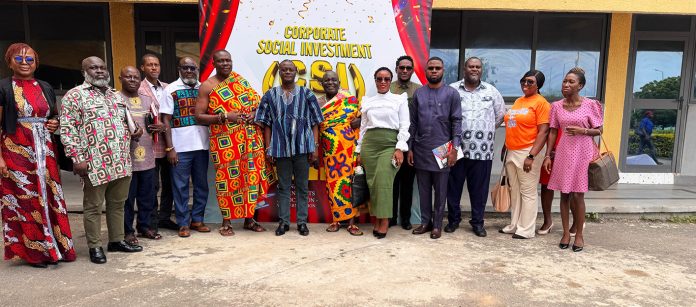Western Regional Minister, Joseph Nelson, has issued a powerful call to companies operating in the region, urging a fundamental shift in Corporate Social Responsibility (CSR) practices.
Launching a ground-breaking CSI Dialogue and Exhibition (CSIDE) project, the Minister declared that Corporate Social Investment (CSI) must move beyond mere transactions to become truly transformational, creating generational wealth and empowering communities.

At the launch of the program, which is a partnership between the Western Regional chapter of the Ghana Journalists Association (GJA) and the Western Regional Coordinating Council, on Friday July 18, 2025 Mr Nelson challenged the status quo of corporate giving.
“As we rethink the direction of Corporate Social Responsibility in our region, I urge all companies to design CSR packages that are transformational, not just transactional.
CSR must go beyond one-off donations and ceremonial gestures. It should aim at creating generational wealth, especially by empowering local communities with the tools, skills and opportunities to build sustainable livelihoods.”
Emphasising the critical role of trust and partnership, he highlighted the region’s commitment to fostering public-private collaboration.
“We must recognise that trust is built not only through words but through consistent, transparent and responsive action.
“When corporations align their investments with the needs and aspirations of our communities, trust is deepened. When communities feel heard, included, and empowered, trust is strengthened.”
The Minister directly addressed the region’s pressing infrastructure gaps in rural roads, water systems, schools, health centres and ICT, stating that government alone could not bridge them calling for strategic corporate partnerships.
“Corporate Ghana, particularly those with a footprint in our region, must partner meaningfully… CSI can be directed towards strategic infrastructure projects that will yield long-term, shared benefits.”
Joseph Nelson outlined the region’s key development priorities where transformational CSI is urgently needed as expanding access to quality STEM and TVET education, improving health outcomes, enhancing rural and urban road connectivity.
The rest are promoting environmental sustainability amidst mining and coastal threats and supporting local enterprise development and job creation. Crucially, he called for formalised collaboration with local authorities.
“I implore all corporate institutions to actively promote partnerships with the Metropolitan, Municipal, and District Assemblies (MMDAs)…by incorporating Corporate Social Responsibility programmes into the Medium-Term Development Plans of the Assemblies, we can ensure a more coordinated, strategic and impactful approach to development.”
This, he argued, would eliminate duplication and enhance synergy.
He then charged that “CSI must go beyond compliance. It must be rooted in corporate values and driven by genuine commitment… What we need is a culture of corporate citizenship, where companies see themselves not just as profit-makers, but as development partners.”
GJA-Western Regional Chairman, Desmond Cudjoe, underscored the initiative’s purpose: “Our region’s prosperity hinges on collaboration. While challenges persist… we gather today to celebrate a powerful truth: CSI initiatives are already driving change.”
The CSIDE project, he explained, is aimed to amplify this impact. Paramount Chief and President of the Gwira Traditional Area, Awulae Angama Tu-Agyan II, offered the active partnership of traditional leaders:
“We offer cultural insight, legitimacy, and continuity. We are ready to be active partners not passive observers…
“We invite companies to engage us early, consult us meaningfully and work with us to ensure that no community is left behind.”









